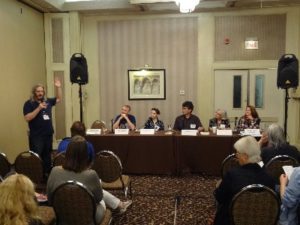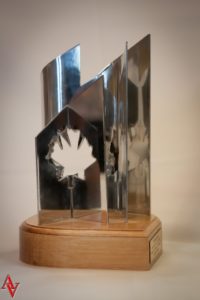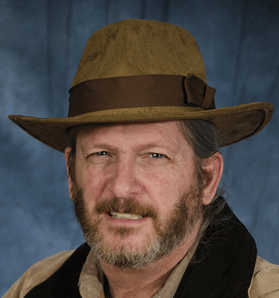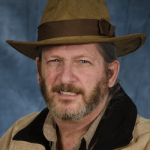An interview with Randy McCharles.
We all attend writer conventions, but what if you wanted to start one? Where do you start? What makes a con good? How do you draw in the big literary names?
Author Randy McCharles founded When Words Collide, A Readers and Writers Festival (WWC) in 2011. Held in Calgary Alberta, which is Western Canada’s hub of genre and literary writing,
I had the pleasure of asking Randy for his tips and insights into establishing a successful writing convention. There’s a link for some special content at the end of the interview so please don’t miss that!
 WWC’s tagline is A Reader’s and Writer’s Festival. Why this branding rather than simply making it a writers’ convention or a writers’ and fan convention?
WWC’s tagline is A Reader’s and Writer’s Festival. Why this branding rather than simply making it a writers’ convention or a writers’ and fan convention?
If you are a writer, you will know that there are numerous writers conferences out there, even in western Canada. When looking to start a literary event in Calgary, I didn’t want to start an event like one I could already go to, but something different. I did want to provide a networking opportunity for writers and publishers, but I also wanted to create an opportunity for readers to meet authors they might have read as well as discover new authors. The tag line is a very good description of our event. We chose the word ‘festival’ over ‘convention’ because it is more apt to what we are about. Though we are educational, we are also fun. Smiles and laughter are encouraged.
Our demographics show that almost half of our attendees consider themselves readers. We attract readers by offering inexpensive passes ($45-$55 for a weekend pass, depending on when it is purchased), while most writers conferences cost much more. Inexpensive passes are common to speculative fiction fan conventions that are designed primarily for non-professionals. Very few readers will spend $100-$300, not even to see their favourite author (especially as we also provide several free events where the public can meet our guests.)
Though many conferences and festivals are genre-specific, it has always been my feeling that genres have more in common than differences. Most readers, also, read across multiple genres. The speculative fiction convention model is not common outside of SF&F, but we wanted to see if other genres as well as literary readers & writers would give it a try, so we invited them. To our delight, they came. We now try to have representatives for each genre an well as literary and poetry on our organization board.
There is a very dynamic dealer’s room at WWC. Writers congregate, presses sell books, writers and presses are talking business and making book deals, all the while books are being sold by writing groups, book sellers, and publishers.
Many conferences (and book stores) offer a range of non-book products. Our Merchants Corner is a book-only room, though we do include some art. Our most unique table is the Shared Authors Table, where attending authors not represented by other vendors may have their books sold. This table typical does over $2,500 worth of sales over the weekend. As far as I am aware, we did it first back in 2011, though I have seen the concept more recently at other events.
We also have a hotel-provided snack bar and seating area in the Merchants Corner where people can get drinks, soup, sandwiches, and salads. Something I haven’t seen anywhere else.

For a convention to have a good reputation, several factors must come together from programming, to guests of honour, attendee packages, and advertising. I’d like to talk about some of these aspects so that we can understand what it takes for them to work well.
Any event must decide on a mission statement and a business model. Our mission statement is: to bring readers and writers together in a celebration of the written word. Our business model is a fusion of best practices I’ve taken from other events I have attended. A few important concepts are:
- Inclusive and inexpensive to attend.
- 100% volunteer run.
- Multi-track so attendees always have something of interest going on.
- A safe and fun environment.
Since an event will fail if no one shows up, let’s begin with advertising. While we do have a modest marketing budget and place posters and pamphlets in book stores, word-of-mouth is by far the best advertising. When we started in 2011 we made sure to promote our new event by speaking to writers groups and placing marketing literature in books stores. Even so, we budgeted for 150 people showing up. 280 did, so we were off to a good start, growing each year until we are now peaked out at 750 people. Most people found out about us from a friend. We have no desire to grow past 750 attendees as I find larger events too impersonal.
Guest speakers are tricky as no one can agree on who to invite. If we receive 100 feedback forms from attendees we will receive 100 guest suggestions. Each year we try to invite guests that cover a range of disciplines who are good speakers. If we need to reduce our budget somewhere, we look to the guest budget first (example: finding guests closer to home).
Our attendee package is very simple and economical: a plastic name badge on a string, a 5.5” x 8.5” stapled program book, and a single sheet quick guide. We don’t have a welcome bag, though book bags and fancy badge holders are available.
Our venue, the Delta Calgary South, has meeting space for as many as 15 concurrent events, giving attendees lots to choose from during the weekend. This means our program has over 200 different sessions to plan. Again, using the speculative fiction model, we open the program to attending professionals, encouraging them to speak, take manuscript pitches (if they are acquisition editors), and participate in our Blue Pencil Café, all on a volunteer basis. Each year around 150 attending experts join with our 5 or 6 festival guests to provide a dynamic and diverse program for the attendees.
There are other aspects to the festival, including a hospitality suite, a mass autograph session, a banquet, and even awards ceremonies as we sometimes host awards. As you can imagine, all of this requires a large number of volunteers putting in time and effort. We also try to do things efficiently with the lowest demand on volunteer time as possible.
On the topic of programming, in WWC 2017, there were ~80 panels on craft and business, blocks of time with guests of honour, blue pencil cafes, and pitching sessions. There is a variety of topics which appeal to both readers and writers and this can be seen by the packed rooms at many of the panels. How do you assess and what is needed and then deliver it?
The short answer is: we don’t. Like our staff, our presenters are volunteers. We ask them what they would like to present, and then we try to accommodate them. We do let them know what types of programming, such as what you listed above, we are looking for. This approach has some drawbacks, but in the end I believe it has more advantages. Presenters come up with all sorts of brilliant ideas we would never think of. This approach also greatly reduces demand on volunteer effort to put the program together.
Guests of Honour Guy Gavriel Kay, Diana Gabaldon, Brandon Mull, Brandon Sanderson, Jack Whyte, Kevin J. Anderson, David B. Coe, Robert J. Sawyer, Ian Hamilton, Patricia Briggs, Anthony Bidulka, Kelly Armstrong, Sam Hiyate (The Rights Factory), and Sally Harding (Cooke Agency) are a few of the big selling authors and agents who have come to WWC. Some continue to come back as festival attendees because, as I’ve heard them say, it’s an awesome experience.
Since we are a 100% volunteer event, we do not budget for speakers fees. While we do cover travel and hotel for our festival guests, they, like everyone else, are donating their time and talents to participate at our festival. People need to understand that the business model of many speakers does not include speaking at events such as ours on a voluntary basis. Many of our invitations have been turned down. No hard feelings. That’s just the way it is. The outcome, however, is that speakers who do accept our invitations enjoy events such as ours and regularly accept invitations such as ours. And yes, we are fortunate that many of our guests choose to return when they can.
The main reason that guests return, I believe, is that we are different from most other conventions. We chose to call ourselves a festival rather than a conference or convention, because we want our event to be a party. While many writers do network and learn from each other, they also attend our festival because it is fun. People are having a good time. Our guests have a good time.
The other reason guests return is because we treat them well. Each guest is assigned a liaison to handle transportation and any needs they may have. We provide our guests breakfast and banquet tickets and take them out to dinner a couple of times. They each receive a welcome basket with souvenirs and goodies. In other words, we give them the respect they deserve for agreeing to join us on their own time.
I must say, that attendees really appreciate how accessible the guests have been, not only with their readings and key note speeches, but some hold workshops and most are willing to chat informally with readers and writers.
One of the things that makes us different from other conventions is that we don’t have a presenter green room. I never understood the point of separating the speakers from the people who have come to see them. Our guests usually spend their free time in the Merchants Corner, the Hospitality room, or the bar where they can mingle with attendees.
We also give our guests the option of holding a master class so that a smaller group of attendees can spend several hours with them. I, for one, very much enjoy attending master classes whenever I can.
 In 2011 WWC had 282 people attend. 2017 had 750 attendees. WWC has been nominated for the Aurora Award for best volunteer-run organization every year and has won the award 6 times. Incidentally, for those who aren’t aware, the Canadian Science Fiction and Fantasy Association’s Aurora Award is a fan appreciation award so being nominated and winning is a great vote of confidence. Obviously, you have a lot of happy customers! What have they told you why they like WWC so much and what does your volunteer core do to ensure their satisfaction?
In 2011 WWC had 282 people attend. 2017 had 750 attendees. WWC has been nominated for the Aurora Award for best volunteer-run organization every year and has won the award 6 times. Incidentally, for those who aren’t aware, the Canadian Science Fiction and Fantasy Association’s Aurora Award is a fan appreciation award so being nominated and winning is a great vote of confidence. Obviously, you have a lot of happy customers! What have they told you why they like WWC so much and what does your volunteer core do to ensure their satisfaction?
We are thrilled to be nominated for the award each year and to have won so often. As you say, the award is for fan-run events (meaning volunteer-run), such as CanCon in Ottawa, VCon in Vancouver, and numerous other volunteer-run events across Canada, ranging from international conventions that are sometimes hosted in Canada to various public reading series.
All volunteer-run events, no matter the size, are limited by the ability of the organizers to put something together. For free. In their spare time. When Words Collide is fortunate in that we have a board of 20+ volunteers to plan each year’s festival. We also rely on an addition 50+ on-site volunteers during the festival. Even so, there is only so much we can do, so we try to make sure that whatever we do looks, from the outside at least, amazing and flawless. We are regularly asked by attendees why we don’t add something to the festival. My reply is always the same. It would require more manpower than we have. This might be a good time to ask your readers if they are interested in joining our board or participating as an on-site volunteer. J We can always use more help.
What tips do you have for anyone wishing to start a convention in their community?
First off, a convention is big. Very big. WWC costs around $40,000 to put on. When Creative Ink (Burnaby, BC) asked for advice getting started, I suggested they do a 1-day event to get their feet wet, which they did in 2015. They learned a lot and went to a full weekend in 2016. Here are some quick tips to consider:
- Attend other events to see what they do, what you like, and what you don’t like.
- Do what you want to do, not what others want, even if it is totally different (like WWC was in 2011).
- Find some good help.
- Start small and set the bar low. Grow as circumstances allow.
- Spend money wisely and build a modest rainy day fund.
- Make sure you have fun doing it.
Something to know is that people are happy to be helpful. If you are unsure about anything, ask around and you’ll get lots of advice. If something sounds like it will work, problem solved.
Any special announcements for 2018?
Our 2018 festival is 11 months away and we have already sold 25% of the passes. We are typically sold out in June, so don’t wait too long to get your pass. The only thing I’d like to say at this time is that we have an amazing line-up of festival guests next year: Peter V. Brett, Harold Johnson, Erin Lindsey, Deanna Raybourn, and Arthur Slade. If you are unfamiliar with these authors, you will want to change that. Literary agent Sam Morgan of Foundry Media is also joining us. Several of our past guests are returning. I’m looking forward to yet another excellent festival.
And now for the SPECIAL LINK: WWC has a variety of podcasts available on it’s website and they’re awesome! Check them out here! Who knows, maybe they’ll inspire you to come to When Words Collide in 2018.


 Evan Braun is an author and editor who has been writing books for more than ten years. He is the author of The Watchers Chronicle, a completed trilogy. In addition to writing science fiction, he is the managing editor of
Evan Braun is an author and editor who has been writing books for more than ten years. He is the author of The Watchers Chronicle, a completed trilogy. In addition to writing science fiction, he is the managing editor of 
